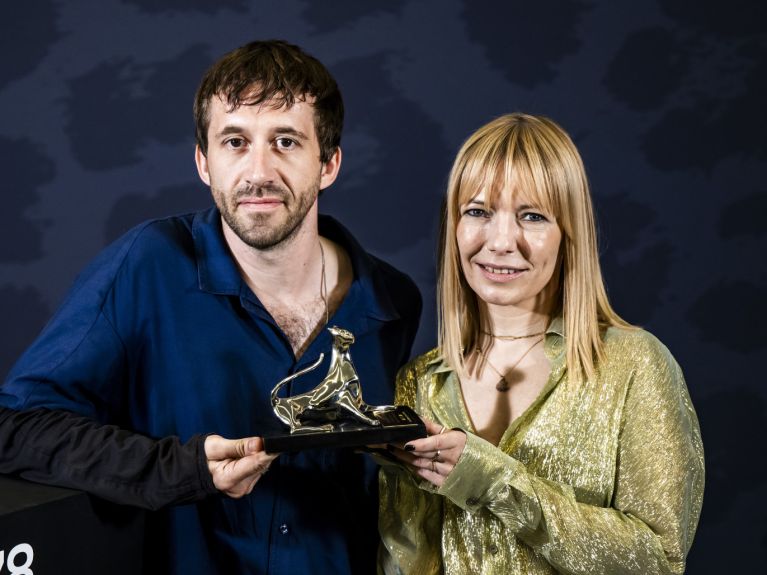Poetic radiance on screen
The German-Austrian directing duo Elsa Kremser and Levin Peter combine documentary and fiction – and have achieved international success.

A model fleeing from her own perfection, a mortuary technician who paints the dead – and a film that brings their worlds crashing together in a neon-lit night: White Snail made Elsa Kremser and Levin Peter internationally known overnight. Premiered in the international competition at the Locarno Film Festival, it was awarded the Special Jury Prize. The two leads, Marya Imbro and Mikhail Senkov – both non-professional actors – shared the Pardo for Best Performance. The screenplay itself followed an unusual approach: it only set out situations and developments, leaving the dialogue open. “We knew Marya and Mikhail so well that we knew how they would speak and react,” explains Levin Peter.
Dieses YouTube-Video kann in einem neuen Tab abgespielt werden
YouTube öffnenThird party content
We use YouTube to embed content that may collect data about your activity. Please review the details and accept the service to see this content.
Open consent formThe fact that Senkov works in a mortuary in the film is no coincidence – it is his profession in real life, too. Kremser first met him ten years ago in Minsk and soon found herself in his apartment, its walls hung densely with oil paintings. The pictures showed the dead, but not as rigid likenesses. “They appeared strangely alive, at once vulnerable and marked by an unexpected tenderness,” Kremser recalls. “In his paintings Misha celebrates impermanence, showing that every body eventually decays.”
Fusion of documentary and fiction
The film draws on elements of its actors’ biographies but carries them into a different, more concentrated reality. While Senkov’s paintings translate death into poetic forms, Imbro embodies the world of the flawless as a model – a role that likewise mirrors her real life. But beneath the perfect surface lies fragility: her character is plagued by depression, self-doubt and suicidal thoughts. “White Snail” brings these seemingly opposite worlds together, setting the social pursuit of perfection against the experience of decay and finiteness.
Minsk defines the visual style of the film. “We originally associated the city with grey concrete blocks,” says Levin Peter. “But on location we discovered the wild colours of the nights, the futuristic satellite towns, the shopping centres full of neon light.” Many scenes were shot using only available light: neon tubes, street lamps, mobile phone screens. The result is an aesthetic poised between documentary directness and poetic radiance.
German-Austrian collaboration
Kremser and Peter’s collaboration crossed borders from the outset. The two of them studied at Filmakademie Baden-Württemberg, founded their production company Raumzeitfilm in Vienna in 2016, and since then have moved naturally between Austria and Germany. This dual grounding also shapes their way of working. “In Austria, art-house cinema is more clearly separated from commercial projects and enjoys greater recognition,” says Kremser. Even so, Germany remains a key pillar: their films are always made in close cooperation with regional funding programmes and broadcasters such as ZDF and ARTE. There is no strict division of labour: whether ideas, financing or scripts – every decision is made in dialogue. Their films bear a joint hallmark.
European talent programmes
Kremser and Peter also benefited from European talent programmes. They received a Kompagnon Fellowship, took part in the TorinoFilmLab and later secured support from Eurimages. For Peter, these platforms are above all places of intense dialogue: “Discussions with other international directors and reading each other’s scripts can be very enriching and help you move your own projects forward.”
More funding for German cinema
Fresh momentum is currently coming from Berlin: Minister of State for Culture Wolfram Weimer has announced that federal film funding will nearly double in 2026 – from now on, 250 million euros a year will be available to provide planning security and strengthen international productions. Kremser and Peter welcome this step and hope it will give many filmmakers the support they need in order to pursue their work.



